Children and the Criminal Justice System in Ghana | Free E-Book on Juvenile Justice Reform
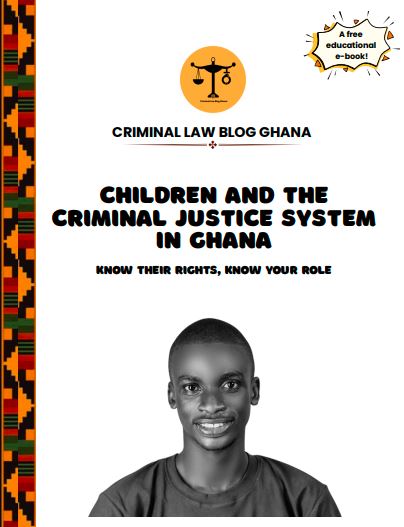
This free educational e-book provides clear, practical guidance on Ghana’s juvenile justice system, explaining the rights of children and the responsibilities of parents, teachers, and community leaders. It simplifies complex legal frameworks such as the Children’s Act (Act 560) and the Juvenile Justice Act (Act 653), offering accessible information for anyone seeking to understand how the law protects children in conflict with the law. Developed by Criminal Law Blog Ghana in collaboration with Reduce Recidivism Ghana, the publication highlights the shared responsibility of society in ensuring that every child is treated with dignity, fairness, and compassion throughout the justice process. It aims to empower communities to support prevention, rehabilitation, and reintegration — key pillars for reducing youth offending and recidivism in Ghana. The foreword, written by Tracy Frimpong, Esq., Founder and Executive Director of Reduce Recidivism Ghana, underscores the transformative role of education, compassion, and reform in building a more inclusive justice system. Through her message, she calls on all stakeholders to embrace knowledge as a tool for change, reminding readers that with understanding comes responsibility — and with responsibility, the power to restore and protect young lives. Read or download the e-book here Visit Criminal Law Blog Ghana for more resources and insights on Ghana’s criminal justice system.
Digital Literacy for a New Narrative: Training Inmates at the Senior Correctional Center
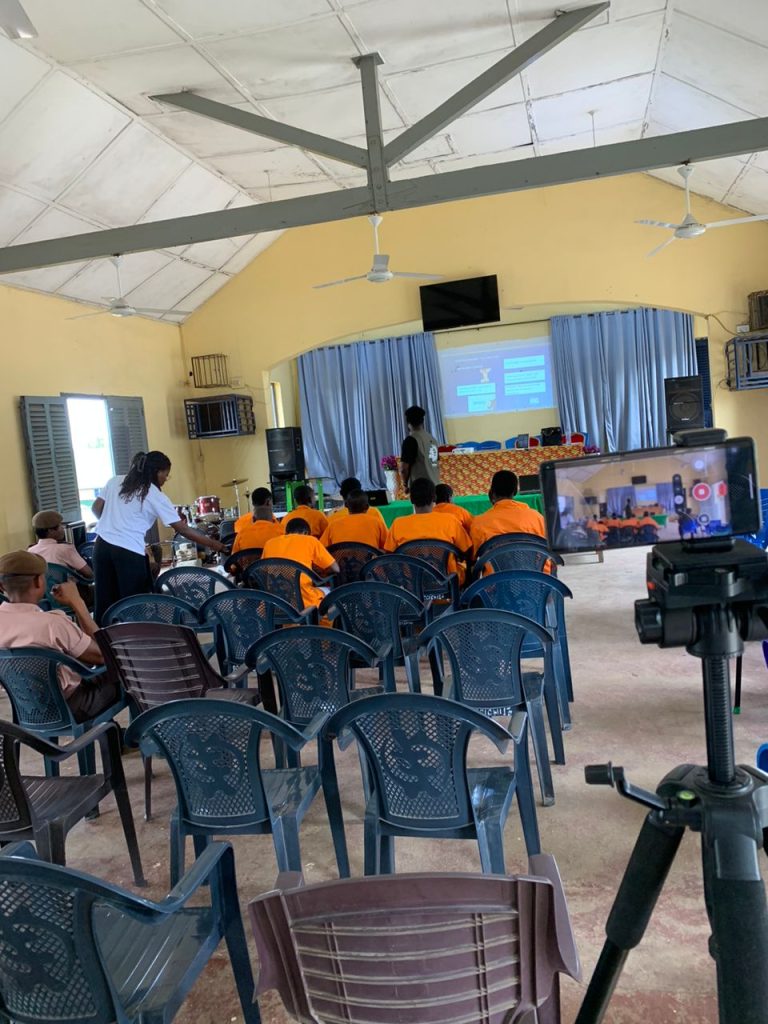
On Wednesday, 10th September 2025, we at Reduce Recidivism Ghana continued our mission to minimize reoffending by organizing a digital literacy workshop at the Senior Correctional Center in Dzorwulu, Accra. This initiative is part of our broader commitment to rehabilitation, reentry support, and skills development for juveniles in Ghana’s correctional facilities. The session was facilitated by Tracy Frimpong, Everloving Owusua Apenteng, and Oheneba Poku Boakye, and focused on a theme that shapes both individuals and institutions: branding. For the 15 inmates and 6 prison officers present, the workshop redefined what branding really means. We taught participants that branding is not just about logos, designs, or flashy visuals. It also includes copyrights, trademarks, and the less visible elements that make a person, product, or organization uniquely identified. To bring this to life, we used the familiar example of Pepsodent in Ghana. Although Pepsodent is one specific brand of toothpaste, its name has become so strong in the public mind that many people use it as a generic word for toothpaste, even when buying another brand like Colgate. This example highlighted the power of branding in shaping everyday choices. More Than Digital Skills The session was hands-on and interactive. Participants were introduced to Canva, a digital design platform, and practiced creating complementary cards and flyers. Some familiar faces from our previous soap-making and afterwash workshop joined in again, showing enthusiasm and consistency in their learning journey. But this workshop was about more than just digital design. Just as companies use branding to reshape public perception, we believe it is time to rebrand correctional facilities and inmates themselves. Too often, society views prisons only through the lens of crime and punishment such that often inmates are defined solely by their past mistakes. At Reduce Recidivism Ghana, we are committed to documenting our experiences with correctional facilities and sharing the talents and progress of inmates. In doing so, we hope to change the public narrative — from stigma to transformation, resilience, and potential. As an organization, we recognize that this vision requires sustainable support. During this workshop, our facilitators relied on their personal laptops, which highlights the urgent need for better resources. Many corporate organizations in Ghana regularly phase out older IT equipment — computers, laptops, and accessories that could still serve a great purpose. By donating such equipment, partners can help us establish digital labs in correctional facilities, giving young people the opportunity to build essential digital and creative skills. Beyond empowering inmates, this kind of support directly advances corporate social responsibility (CSR) goals and leaves a meaningful social impact that extends far beyond prison walls. We extend a call to action to corporate bodies, NGOs, and stakeholders: partner with us in this mission. Together, we can provide inmates with the tools to rewrite their personal stories, reduce recidivism in Ghana, and build safer, stronger communities. At Reduce Recidivism Ghana, we believe prisoners matter. Every young person deserves the chance to be seen, heard, and to rebrand for the future.
Skills for Change: Soap Making Workshop Inspires Juveniles at Senior Correctional Center
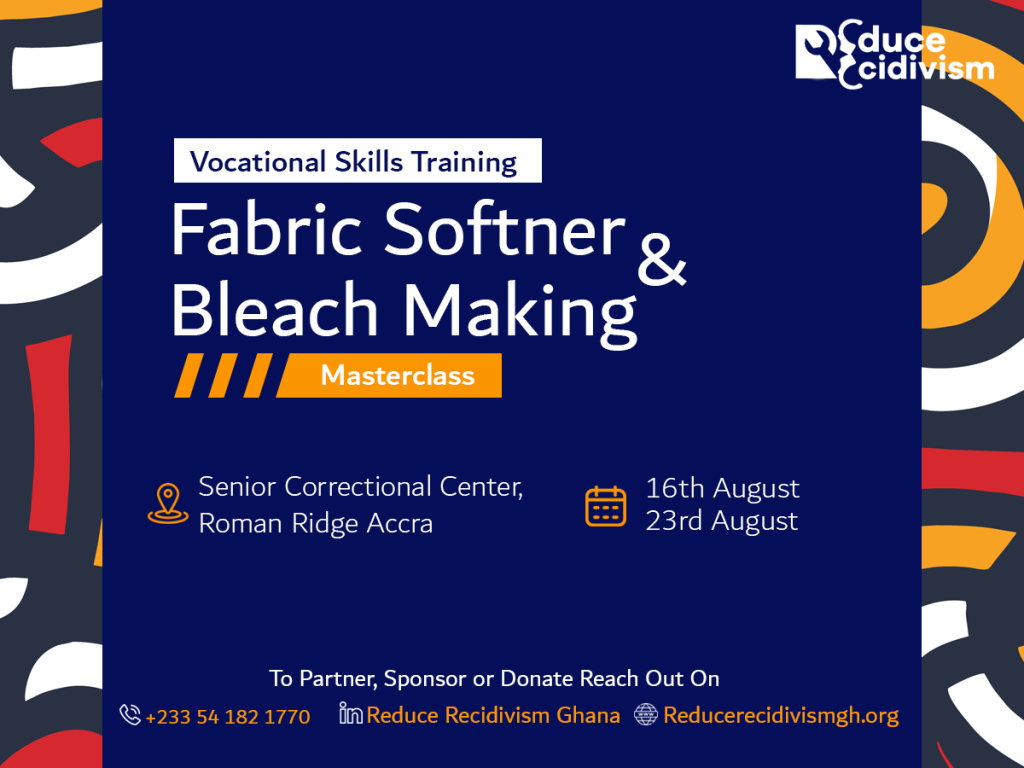
On the 27th August 2025, the Senior Correctional Center at Dzorwulu, a suburb of Accra, was filled with excitement as juveniles and prison officers alike took part in a hands-on training session on liquid soap and fabric softener production. Organized under the Reduce Recidivism initiative and facilitated by Everloving Owusuaa Apenteng with support from founder Tracy Frimpong, the workshop aimed to equip participants with practical, marketable skills to help them rebuild their lives after incarceration. From the very start, Kwesi, an inmate often labeled difficult, showed remarkable enthusiasm, his energy drawing in others as he stirred each mixture with precision and focus. What began with nine participants soon grew to fifteen as curious onlookers joined in, eager to learn. Load More End of Content. The process itself was simple yet captivating. With guidance from the facilitators, the group dissolved caustic soda in water, then mixed in sulphonic acid, fragrance, and color before adding soda ash for thickness. Everyone—juveniles and officers alike—took turns stirring steadily as the dull solution transformed into a bright, lemon-green liquid detergent. Bottling followed amid cheers and laughter before the session moved seamlessly into fabric softener preparation, leaving the participants with neatly packaged products and a clear sense of accomplishment. But beyond the bottles of soap and softener lay a deeper lesson. Just as Kwesi’s enthusiasm inspired others to join, the right opportunities can influence lives toward change. This single workshop demonstrated that reducing recidivism goes beyond punishment; it is about equipping young people with skills, confidence, and hope for a better future. Reduce Recidivism calls on individuals, organizations, and partners to support such initiatives—because each skill shared today could keep a life from returning to crime tomorrow.
Rewriting Stories Behind Bars: My Visit To Osu Correctional Center.
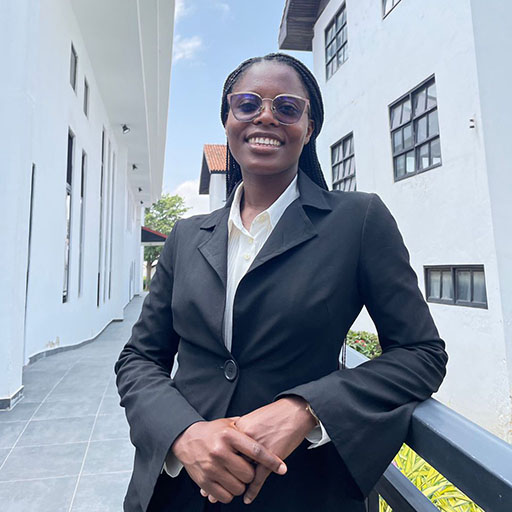
On February 5, 2025, I had the incredible opportunity to visit the Osu Correctional Center to teach a group of young offenders how to make bleach, a simple but powerful skill with real-world applications. As we carefully measured ingredients and followed each step, I realized this was more than just making a cleaning solution. It was about restoration, rewriting stories, and offering a second chance.From the moment we started, I was struck by the energy in the room. These young girls were eager, full of questions—not just about bleach, but about life itself. They asked me about careers, about dreams, about possibilities beyond the walls surrounding them. It shattered every stereotype. They were not lost causes. They were young girls searching for renewal.Then came the moment that changed everything. A girl, her hands still damp from mixing the solution, looked up and said, “I am a newer version of myself.” Her words carried weight beyond the bleach we had made—they embodied transformation. I immediately thought of 2 Corinthians 5:17 ‘‘Therefore, if anyone is in Christ, he is a new creation; the old has passed away, behold, thenew has come!”That day, I realized the importance of redefining our perceptions of ex-prisoners. These young girls are not bound by their past; they are waiting for a future. But they cannot do it alone. As we filled bottles, we also filled hearts with hope, with purpose, with the belief that change is possible. We encouraged them to look beyond their past mistakes and to embrace the possibility of contributing positively to their communities. Redemption is not a myth. It is a choice society must be willing to extend. This experience opened my eyes to a powerful truth: we all make mistakes, but we all deserve a second chance. If we invest in skills, mentorship, and support, we can break cycles, minimize recidivism rates, and grant these individuals a genuine opportunity to rebuild their lives. On February 5, 2025, I played a small role in change, but change, no matter how small, matters. The young girls at Osu Correctional Center reminded me that renewal is possible, that society must believe in transformation and embrace those willing to change. Together, we can reduce recidivism. Together, we can rewrite futures. Let’s not just talk about second chances—let’s create them. By Everloving Owusu Apenteng, Facilitator, Reduce Recidivism
Presidential Amnesty, Reformation, and the Fight Against Recidivism
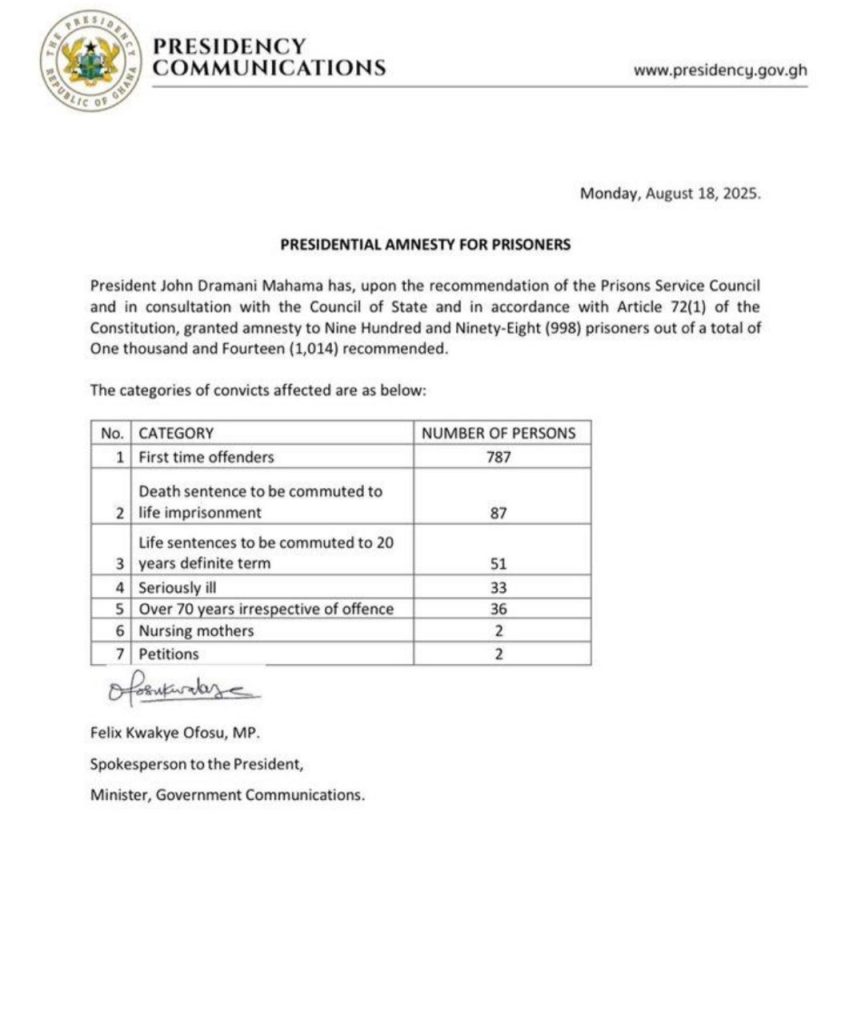
In a recent exercise of constitutional authority, the President of the Republic of Ghana granted amnesty to nearly one thousand inmates across various correctional centers in the country. The decision, rooted in Article 72 of Ghana’s Constitution, affirms the President’s legitimate power to remit sentences, pardon, or commute punishments. Importantly, such decisions are not taken in isolation—they are made in close consultation with institutions that superintend correctional facilities, including the Ghana Prisons Service and the Council of State. This ensures that the process is guided by fairness, humanitarian considerations, and the broader goal of national reformation. While this gesture is laudable, the story does not end at the prison gates. Inmates who gain their freedom often face harsh realities upon re-entering society. Stigma remains a formidable barrier; many are unfairly branded by their past, regardless of the reform they have undergone. Beyond stigma, the greatest hurdle is economic survival. Financial struggles, lack of employment opportunities, and overdependence on relatives often make reintegration difficult. This economic void has historically fueled recidivism—the tragic cycle where ex-offenders fall back into crime simply as a means of survival. The true purpose of incarceration should be reformation and change, not perpetual punishment. To reduce recidivism and empower reformed citizens, skills training is indispensable. It is here that Reduce Recidivism Ghana, founded by Tracy Frimpong, is making a significant impact. The organization is dedicated to providing inmates with vocational, entrepreneurial, and literacy skills that foster self-reliance. Training covers a wide spectrum—from detergent production (including bar soap, liquid soap, and shower gels) to sewing, shoemaking, and digital literacy. These are practical skills that can be translated into income-generating ventures upon release. The passion and commitment of Tracy Frimpong and her team are evident. To date, Reduce Recidivism Ghana has successfully organized over 30 workshop sessions across correctional centers in Accra, with a strong emphasis on the reformation of juveniles. The vision is clear: break the cycle of recidivism, empower former inmates, and promote entrepreneurship that contributes to Ghana’s socio-economic growth. To scale this mission, the organization calls for sponsorship, partnerships, and donations from individuals, corporate bodies, religious institutions, and civil society organizations. Additionally, there is a heartfelt appeal for volunteers—trainers with expertise in diverse skills—who can contribute to broadening the scope of training offered to inmates. As a nation, we must remember that inmates are not “lesser” humans; they are our brothers and sisters who deserve the opportunity to reset their lives. Successful reformation and reintegration serve not just the individual but the entire society by reducing crime and fostering productivity. We extend profound gratitude to the President of Ghana for exercising his constitutional mandate to grant amnesty, a decision that underscores his commitment to the resetting agenda. But we also remind ourselves that the journey of true justice continues beyond pardon. It lies in ensuring that reformed men and women are fully equipped to rejoin society with dignity, independence, and hope. This is the very fight Reduce Recidivism Ghana has taken up—and one we must all support.
About the Founder

Tracy Frimpong A passionate Ghanaian lawyer with a deep commitment to human rights and criminal justice reform. Called to the Bar in 2024, Tracy’s legal practice and advocacy are driven by a vision of a just society—one where human dignity is upheld, and crime prevention is tackled through both legal and social interventions. Her journey into reformative justice was ignited after witnessing the conviction of an 18-year-old girl. This pivotal moment moved her to explore solutions beyond the courtroom that address the root causes of crime, especially among the youth. In response, she founded the ‘Reduce Recidivism Ghana’ initiative—an innovative vocational skill training program aimed at empowering young offenders with practical skills to facilitate their reintegration into society post-incarceration. By equipping them with tools to build sustainable livelihoods, the program seeks to break the cycle of crime and unemployment that often traps ex-offenders. Tracy has conducted several training sessions at the Junior Girls Correctional Center in Accra, awarding certificates to inmates who successfully completed the program. She is currently running another skill training cycle as part of her ongoing mission to create second chances and amplify rehabilitation efforts in Ghana. Her work stands as a testament to the role of young legal professionals in reshaping Ghana’s criminal justice system—one rehabilitated life at a time.
Powering Change: Shoe-Making Training at the Junior Girls Correctional Center, Osu
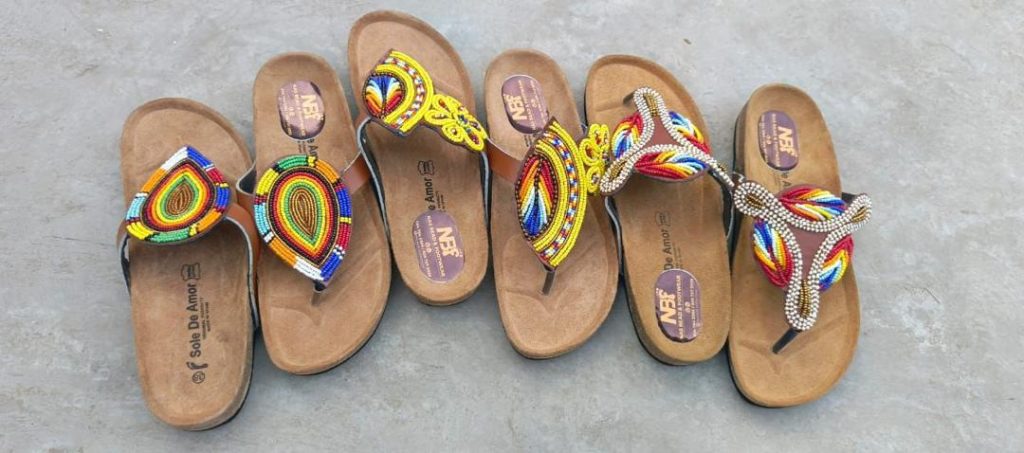
On June 30, 2025, Reduce Recidivism Ghana delivered a powerful session in its ongoing Shoe-Making Training Series at the Junior Girls Correctional Center in Osu, Accra, Ghana. The workshop, led by Tracy Frimpong, brought together 15 young residents of the center for a hands-on experience designed to build practical skills and confidence. Participants were introduced to the fundamentals of sandal-making — including pattern tracing, synthetic leather cutting, strap design, and sole assembly. Using simple tools like scissors, rulers, and pre-cut templates, each girl had the opportunity to transform raw materials into finished footwear. More than just technical training, the session fostered focus, creativity, teamwork, and a renewed sense of self-worth. For many, it marked the first step toward realizing that their future can look very different with the right support and opportunities. This workshop is part of a dedicated vocational rehabilitation program by Reduce Recidivism Ghana, tailored specifically for the young ladies residing at the Junior Girls Correctional Center. The goal is to reduce reoffending by equipping them with practical, empowering skills that pave the way for reintegration, entrepreneurship, and long-term independence. The next session in the series will be held on Wednesday, July 17, 2025, and will focus on dressmaking, along with training in entrepreneurship and business development — extending the holistic approach that merges technical skill with business mindset. Reduce Recidivism Ghana is proud to stand alongside these young women as they take steps toward brighter, self-determined futures. How You Can Help? The work is just beginning. Every donation, volunteer, or shared story helps move the mission forward. Whether it’s sponsoring a tool kit or mentoring a participant, your support creates real opportunities for change. To get involved, visit our Support Us page or follow us on social media for updates. Together, we can reduce recidivism — one skill, one story, one life at a time.
Beads of Hope: Empowering Girls Through the Art of Beadmaking
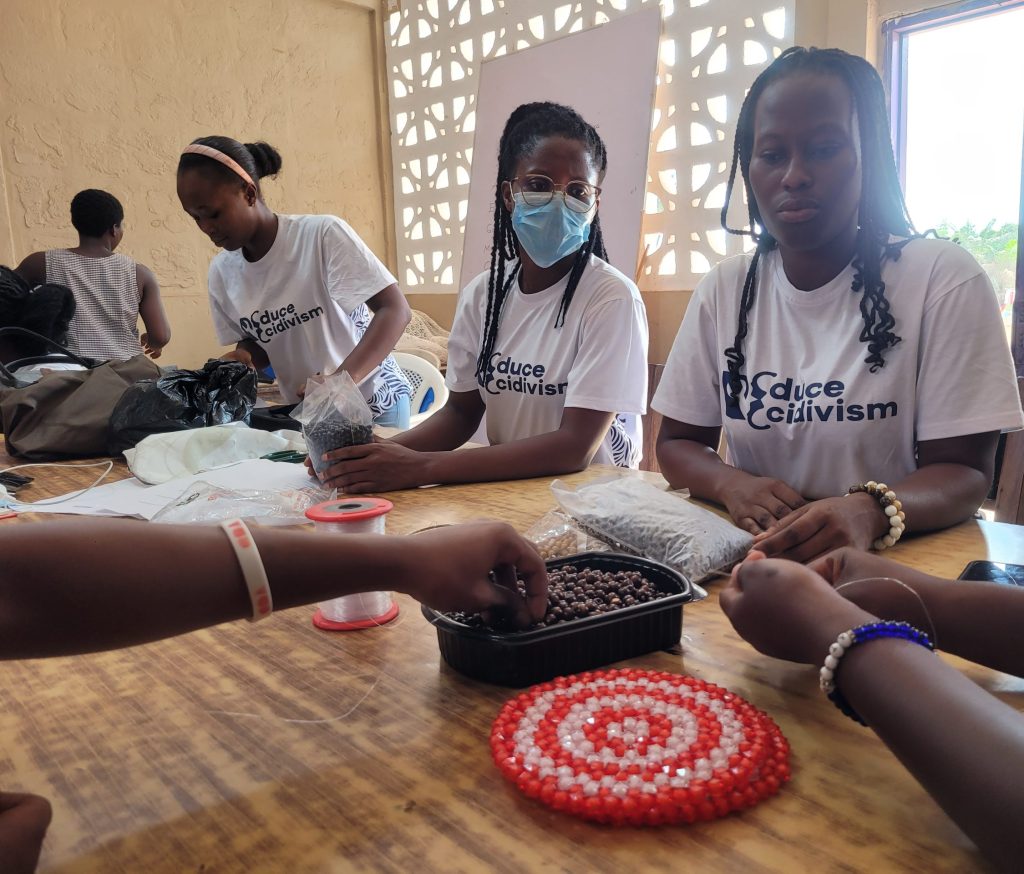
By the Reduce Recidivism Team | Posted: May 7, 2025 In a bright room filled with laughter, concentration, and colorful beads, a group of young girls sit in a circle, stringing hope one bead at a time. For many of these girls, this is the first time they’ve ever felt proud of something they created with their own hands. At Reduce Recidivism, beadmaking has become more than just a vocational skill — it’s a tool for healing, creativity, and empowerment, especially for girls in Ghana’s juvenile correctional system. A Safe Space to Heal and Grow Girls in correctional centers often carry heavy emotional burdens — from trauma, rejection, and societal judgment. Beadmaking offers a safe and nurturing space where they can express themselves, develop patience, and discover hidden talents. “Beadmaking helps me focus,” says Adwoa*, a 16-year-old participant. “When I create something beautiful, I feel like I can be someone new — not who I was before.” The calm, rhythmic process of selecting colors, stringing patterns, and completing a finished bracelet or necklace becomes therapeutic. It teaches not only artistry but also discipline and attention to detail. Crafting a Future Beyond the Walls Beyond its emotional impact, beadmaking is a marketable skill. In many parts of Ghana, handmade jewelry has cultural and commercial value. By learning how to craft, price, and package their work, the girls gain entrepreneurial skills that they can carry into the world after their release. With support from Reduce Recidivism, some girls begin selling their pieces at local fairs, churches, and community events. The income, though small, symbolizes something far greater — independence and a fresh start. Redefining Identity, Restoring Dignity For many of these girls, their identities have been shaped by past mistakes or circumstances beyond their control. Beadmaking gives them a new story to tell — one of creativity, resilience, and transformation. “We want them to see themselves not as ex-offenders, but as artists, businesswomen, and change-makers,” says Tracy Frimpong, founder of Reduce Recidivism. The program also works to connect the girls with female mentors and role models, reinforcing the belief that their lives are valuable and their futures worth investing in. How You Can Support Reduce Recidivism relies on donors and partners to provide beadmaking supplies, workshop spaces, and mentorship support. You can help by: Every bracelet made is a symbol of possibility — and every girl trained is one step closer to reclaiming her life with purpose and pride. Bead by bead, we’re stringing together new beginnings. *Names changed to protect privacy.
Restoring Hope Behind Bars: How Vocational Skills are Changing Young Lives
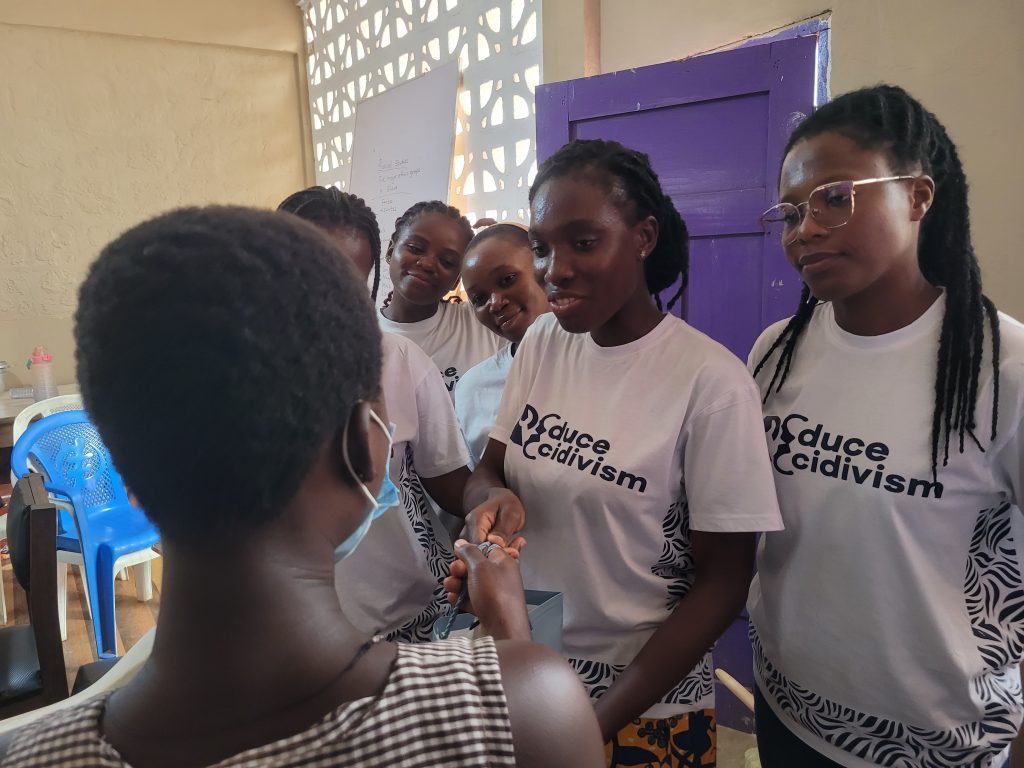
By the Reduce Recidivism Team | Posted: April 15, 2025 In a quiet workshop tucked inside a juvenile correctional center in Accra, 17-year-old Kobby* leans over a wooden frame, carefully smoothing its edges. Just a year ago, Kobby was filled with anger and despair. Today, he’s building furniture — and a future. Kobby is one of dozens of young people who have joined Reduce Recidivism’s vocational training program, an initiative designed to equip juveniles with practical skills and a renewed sense of purpose. A Second Chance In Ghana, juvenile offenders often face stigma, rejection, and limited options after release. Without support, many reoffend, repeating a cycle of crime and incarceration. Reduce Recidivism, founded in January 2025 by youth advocate Tracy Frimpong, seeks to break that cycle. “We believe transformation is possible when young people are given not just punishment, but tools to rebuild their lives,” Tracy says. Through hands-on training in trades such as tailoring, carpentry, and bead-making, participants like Kobby learn more than just a skill — they rediscover dignity. More Than Skills: Building Confidence Each training session is paired with life skills workshops on communication, self-discipline, and emotional resilience. Volunteer mentors walk alongside participants, offering encouragement and guidance. “When I saw people believe in me again, I started to believe in myself,” says Ama*, a recent graduate who now runs a small hairdressing business in her community. From Centers to Communities The impact of the program extends beyond the walls of correctional centers. Families report improved relationships. Communities notice positive change. And most importantly, young people are staying out of trouble and choosing new paths. Reduce Recidivism also works with local leaders and employers to reduce the stigma faced by formerly incarcerated youth. “We must create space for redemption,” Tracy adds. “Our communities are stronger when we restore, not reject.” How You Can Help The work is just beginning. Every donation, volunteer, or shared story helps move the mission forward. Whether it’s sponsoring a tool kit or mentoring a participant, your support creates real opportunities for change. To get involved, visit our Support Us page or follow us on social media for updates. Together, we can reduce recidivism — one skill, one story, one life at a time. *Names changed to protect privacy.

